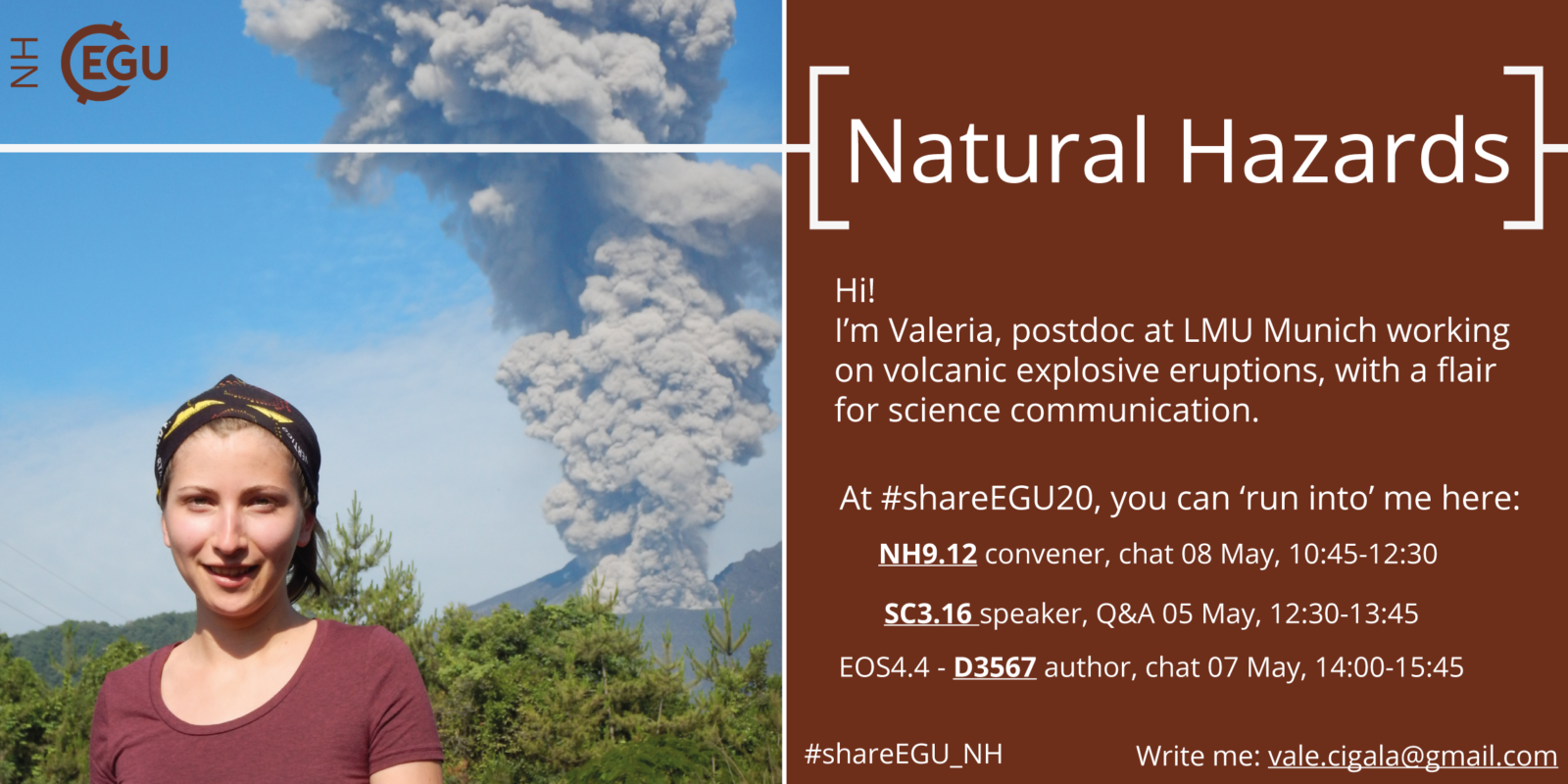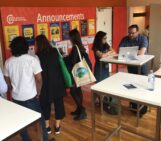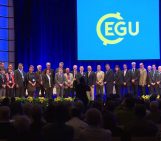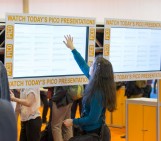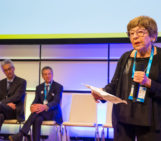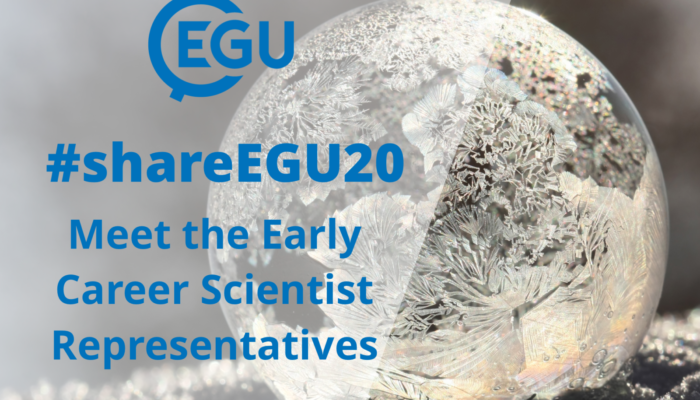
Now that you have met the current and incoming Early Career Scientist Union representatives Raffaele Albano and Anouk Beniest, it’s now time to meet the rest of the current EGU Division representatives!
Atmospheric Sciences (AS): Fernando Iglesias-Suarez

Contact: ecs-as@egu.eu
Postdoctoral scientist at CSIC (Department of Atmospheric Chemistry and Climate, Institute of Physical Chemistry Rocasolano, Spain). I am a climate scientist with interests in tropospheric and stratospheric chemical, radiative and dynamical processes, understanding links and interactions with other parts of the Earth system, and developing and using Earth System Models to address the scientific challenges of global change. As the AS Division ECS representative, I would like to continue former representatives’ efforts on building a strong ECS network (intra- and interdivision) and improve our experience at the EGU General Assembly
Biogeosciences (BG): Hana Jurikova
Contact: ecs-bg@egu.eu

Hana is a postdoctoral researcher at the GFZ German Research Centre for Geosciences – Helmholtz Centre Potsdam. Her research primarily involves the application and development of novel isotopic techniques to gain insights into past climatic and environmental changes, Earth’s biogeochemical cycles and their feedbacks, with focus on carbon cycle dynamics. She is also interested in biomineralisation processes of brachiopods and corals and what geochemistry can tell us about calcification and the state of the oceanic carbonate system. As the BG Representative, Hana hopes to motivate ECS to get involved in activities and initiatives of the EGU and the BG Division, to promote their research, enhance dissemination of scientific knowledge, and would like to encourage anyone interested in contributing to the BG blog to get in touch.
Climate: Past, Present & Future (CL): Carole Nehme

Contact: ecs-cl@egu.eu
Carole is lecturer in physical geography at the University of Rouen (France) since September 2016 with expertise in limestone geomorphology, cave monitoring and palaeoclimate reconstruction from geochemical proxys. A former postdoc fellow at the AMGC research group, Vrije Universiteit Brussels and the Royal Belgian Institute of Natural Sciences, she worked on the reconstruction of past climate in the Levant from geochemical proxys in speleothems. In her new role as the Climate Division ECS representative, Carole with her team hopes to build a strong ECS network in climate and contribute to making the EGU General Assembly a fruitful experience for ECS.
Cryospheric Sciences (CS): Jenny Turton

Contact: ecs-cr@egu.eu
Jenny is a postdoc scientist at Friedrich-Alexander University (FAU) in Erlangen-Nürnberg, Germany. Her main research topics include polar meteorology and climatology, and atmosphere-cryosphere interactions. Currently, her focus is in North East Greenland, to investigate the impacts of the atmosphere on the mass balance of marine-terminating glaciers. Jenny has previously convened short-courses and been a social media rep for the EGU Cryospheric Sciences division (CR). With her role as ECS rep, she hopes to continue building bridges with other divisions to help represent ECS who may fall on the boundary between groups, and to promote equality throughout EGU.
Earth Magnetism & Rock Physics (EMRP): Anita Di Chiara

Contact: ecs-emrp@egu.eu
Anita is currently a working between the INGV of Rome and Scripps (CA) for a two years’ postdoc to study the paleointensity of the Cretaceous using basalts from the Costa Rica ophiolite. She is a geologist and geophysicist with interest in rock magnetism and palaeomagnetism applications to date and correlate volcanic deposits, reconstruct rotation patterns in mega-faults and palaeo-oceanic crust, and understand the origin, evolution and behaviour of the Earth’s Precambrian and Pleistocene-Holocene magnetic field.
As the EMRP ECS representative, Anita plans to bring more networking opportunities between ECS and job makers. She hopes to introduce a new platform in support of mental health for ECS and to raise the visibility of LGBTI+ and underrepresented categories within ECS (gender, disability, ethnicity..). Anita is also the incoming deputy Union level ECS Representative.
Energy, Resources and the Environment (ERE): Natalie Christine Nakaten

Contact: ecs-ere@egu.eu
Natalie is a postdoctoral researcher at the GFZ German Research Centre for Geosciences (Section Fluid Systems Modelling) in Potsdam, Germany. She is an economic geographer by background and focused on techno-economic process modelling. Her research interests are mainly related to the topics Underground Coal Gasification (UCG) as well as gas and energy storage.
As ERE–ECS representative, Natalie aims to motivate ECSs to take part in ERE division activities and hereby strengthen the interchange of scientific knowledge and experiences.
Geodesy (G): Mathis Bloßfeld

Contact: ecs-g@egu.eu
Mathis is a postdoctoral reasearch associate at the Deutsches Geodätisches Forschungsinstitut der Technischen Universität München (DGFI–TUM). His main research topics are reference frames, satellite laser ranging, precise orbit determination of near-Earth satellites and the combination of space geodetic techniques. With his research, Mathis wants to push Geodesy beyond the provision of geodetic measurement time series towards a multi-disciplinary science including the interpretation of the observed Earth system changes. As an ECS Representative, he tries to accomplish that new EGU attendees easily find their way through the EGU tangle. He also works together with Katrin Bentele (TU Graz) on stenghtening the G division social media appearance.
Geodynamics (GD): Nicholas Schliffke
Contact: ecs-gd@egu.eu

Simultaneous to finishing my PhD in subduction modelling in Durham earlier this year, I am also approaching my last weeks as EGU ECS representative for Geodynamics. In the last two years I have enjoyed pursuing communication between Geodynamicists, establishing a firm link to neighbouring divisions (e.g. TS and SM) and meeting many new faces in this wonderful division! I wish my successor all the best, and I’m convinced that she will introduce many news ideas and events which will benefit both the ECS GD community and the entire EGU. During EGU 2020: Sharing Geosciences Online, you will be able to meet me at the GD ECS Networking and Feedback Event (5th May, 19:00) or at my own session (GD5.1) on Wednesday, 6th May 8:30-10:15. If you have any question on GD events or EGU in general, please don’t hesitate to drop me an email: nicholas.j.schliffke@durham.ac.uk. I’m looking forward to meet many of you online! Let’s to shape a futuristic conference together!
Geosciences Instrumentation and Data Systems (GI): Tim van Emmerik

Contact: ecs-gi@egu.eu
Tim works at Wageningen University, The Netherlands, as Assistant Professor in Hydrologic Sensing. His research focuses on developing methods to (better) measure various aspects of the hydrosphere, from riverine plastic pollution to vegetation water stress. As an ECS representative for the GI Division, his mission is to build a strong ECS network within GI that actively participates in the scientific community. His objectives are to (1) build an active ECS committee, (2) improve GI online outreach, (3) connect to the GI ECS membership through scientific and informal sessions at EGU and (4) initiate interdivision activities. If you’re interested in getting involved, you can shoot Tim an email!
Geomorphology (GM): Annegret Larsen

Contact: ecs-gm@egu.eu
Annegret is an assistant professor at Wageningen University and Research (Netherlands). Her research broadly covers sediment transport on hillslopes, fluvial systems and the linkages between them. Most recently, she is working on biogeomorphic feedbacks in streams and floodplains. Annegret has been (co-) convening several sessions at the EGU annual meeting. She is also part of the women in geoscience network and passionate about diversity in geoscience. She has, together with Micha Dietze (GM-ECS Representative in 2018), set up a GM-ECS-team (https://www.egu.eu/gm/ecs/) to reach a larger number of ECS-Geomorphologists and encourage them to engage with the EGU.
Geochemistry, Mineralogy, Petrology & Volcanology (GMPV): Emily Mason
Contact: ecs-gmpv@egu.eu
Emily is a PhD student in the Department of Earth Sciences at the University of Cambridge. She studies gas and aerosol emissions from volcanoes, with a particular emphasis on emissions of trace metals. Her research involves tracing the pathways of metals and metalloids from the shallow magmatic system to the atmosphere and the processes that take toxic elements downwind. The GMPV team aims to raise the profile of GMPV to all members and to create support for GMPV ECS members. They connect to the community through social media (Instagram, Facebook and Twitter) and through the GMPV blog. The GMPV team also aims to support ECS members in their future careers by providing them with resources to explore their options and by promoting their research across multiple platforms. If you would like to know more please get in touch!
Hydrological Sciences (HS): Caitlyn Hall

Contact: ecs-hs@egu.eu
Caitlyn is a PhD candidate at Arizona State University. She focuses on using in situ microbial methods to reduce the potential of earthquake-induced liquefaction in vulnerable locations. She is performing research on biochemical techniques to reduce crude oil contamination in soils. Caitlyn is passionate about growing collaboration in the geoscience community and interaction between scientists and policy-makers and is working to synthesize best practices.
As an ECS rep, she hopes to provide ECSs with additional resources for professional development and opportunities to practice their building skills. Additionally, she is excited to continue to bridge international hydrology communities, like the American Geophysical Union, together to share resources and strengthen the global community.
Caitlyn is an active rock climber and backpacker and still relies on geology friends to identify rocks.
Natural Hazards (NH): Valeria Cigala
Contact: ecs-nh@egu.eu
Nonlinear Processes in Geosciences (NP): Tommaso Alberti

Contact: ecs-np@egu.eu
Tommaso is a postdoctoral researcher at the Institute for Space Astrophysics and Planetology, an Instiute within INAF (National Institute for Astrophysics), in Rome, Italy. His work focuses on nonlinear dynamical system approaches and time series analysis in geosciences with particular interests in solar wind – magnetosphere – ionosphere interactions and coupling, space and near-Earth plasma turbulence, and Earth’s climate dynamics.
As ECS representative he aims to create an active ECS community within the NP Division by proposing new short courses, as the Meet EGU events to discuss the future and challenges of the nonlinear geosciences by bringing together NP officers and ECS, by increasing social media activities and news, and by improving ECS experience at the EGU General Assembly.
Ocean Sciences (OS): Gwyn Evans

Contact: ecs-os@egu.eu
Gwyn is a postdoctoral researcher at the University of Southampton, UK. His work focuses on measuring the interactions between mesoscale eddies and the western boundaries of ocean basins as part of the MerMEED project. As EGU’s Ocean Sciences ECS representative, Gwyn plans to further promote the EGU early career platform through outreach and ECS events to ensure that as many ECSs from all backgrounds have access to the same range of resources. He is keen to encourage the development of a diverse (gender, disability, ethnicity and LGBT) ECS community. Gwyn also hopes to introduce into the ECS platform at EGU discussion of and support for mental health in academia.
Planetary and Solar System Sciences (PS): Maike Neuland

Contact: ecs-ps@egu.eu
I am a physicist/space scientist. I am currently a PhD at the University of Bern/Switzerland (Physics Institute, Space Research and Planetary Sciences division). In my PhD I worked on in situ laser mass spectrometry for planetary exploration. I will finish the PhD this months and stay in Bern as a PostDoc until November. Then I will start a PostDoc at IRF (Swedish Institute for Space Physics) in Kiruna/Sweden, working on the JUICE (Jupiter Icy Moons Explorer) mission, more detailed on the JNA (Jupiter Neutral Atoms) instrument.
I am very happy that we, the PS ECS, are (already) a small active team. We organise workshops, short courses and small contests, not only at the EGU GA, but also at other conferences related to space science (European Planetary Science Congress, for example).
Seismology (SM): Nienke Blom

Contact: ecs-sm@egu.eu
Nienke is a seismologist who works on imaging the Earth’s interior based on the vibrations emitted as a result of earthquakes. She is a postdoctoral research associate at the University of Cambridge and works on seismic waveform tomography, with a specific interest in developing methods to image density. She enjoys reading a good book, hiking, cycling, and cooking.
As ECS rep, she works towards outreach to the community and beyond, and integration and communication between disciplines. In this light, she collaborates with the TS and GD divisions to set up a series of short courses on the “Solid Earth 101,” aimed at early career students and with a specific focus on integration between disciplines. This builds upon the EGU short course “Seismology for non-seismologists,” which she’s already helped organise for the past couple of years.
Stratigraphy, Sedimentology and Palaeontology (SSP): Madeleine Vickers

Contact: ecs-ssp@egu.eu
Madeleine is a post-doctoral researcher at the University of Copenhagen. Her research interests lie in understanding the complex interactions between the various and numerous drivers of Mesozoic climate change both on a global and regional scale.
As the SSP ECS representative, she and the SSP ECS co-rep, John Counts, plan to bring more networking opportunities to SSP early career scientists, between both each other and potential employers. Together, Madeleine and John hope to enable new EGU General Assembly attendees to get the most, in terms of exchange of scientific knowledge, broadening research ideas, and understanding potential future research opportunities, out of their EGU General Assembly experience.
Soil System Sciences (SSS): Steffen Schweizer

Contact: ecs-sss@egu.eu
Steffen is in his last year of PhD at the Technical University of Munich, Germany. His work focuses on the formation and composition of soil microaggregates, especially analyzing spatial distribution patterns of organic matter at the microscale.
As an ECS representative, he aims to create more interdisciplinary links between different subdivisions and stay in touch with other divisions. To achieve this together with a bunch of great people, Steffen is actively involved in organizing science-policy debates, enable more creative community actions like stickers, and sustaining the opportunity for all soil-related ECS to meet informally over dinner and a beer. By exchanging ideas with various soil science societies, Steffen thinks it is very important for the global soil science community to connect the dots and put complex environmental systems like soils in the center of our scientific efforts. If you have enthusiastic ideas about the SSS division do not hesitate to get in touch with him.
Solar-Terrestrial Sciences (ST): Theresa Rexer

Contact: ecs-st@egu.eu
Theresa is in her third year of her PhD at the Arctic University of Norway in Tromsø. She is working with active experiments and Incoherent scatter radars studying the electromagnetic wave and plasma interactions in the ionosphere and space.
As ECS rep, she and her small team aim to create and contribute to an active early career scientist community in the ST division. They organise a popular short course (Meet the Experts – The future of solar terrestrial research) to bring together established researchers and ECS to talk and discuss the future and challenges of our field.
Tectonics and Structural Geology (TS): David Fernández-Blanco

Contact: ecs-ts@egu.eu
David Fernández-Blanco’s research explores how the Earth’s vertical motions evolve over time. David’s research agenda covers post-rift events in Morocco, big transform faults in Sumatra, orogenic plateau growth in Turkey and interaction of plate boundaries in Greece. Using fieldwork and taking a holistic stand, he combines geomorphology, tectono-stratigraphy and structural geology approaches at regional scales. His passion for research is reflected in active community involvement and geo-communication efforts.

